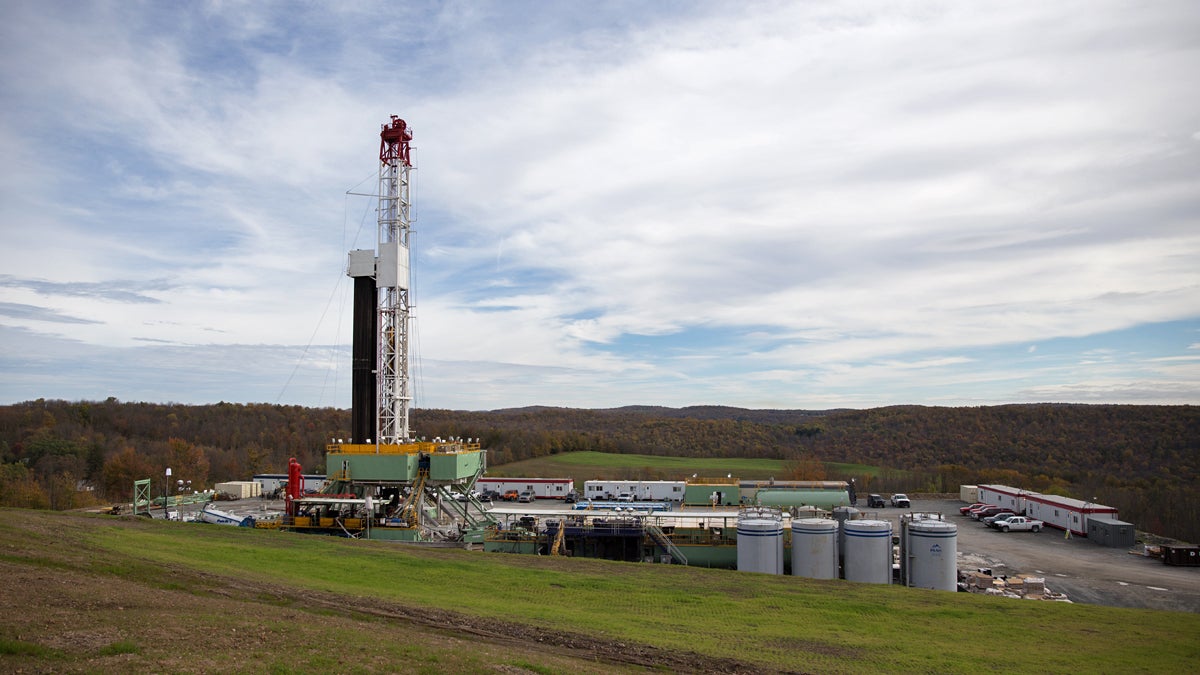Feds consider rules for fracking chemical disclosure
Listen
A Cabot Oil & Gas drill rig nestled into the landscape in Kingsley, Pa. (Lindsay Lazarski/WHYY)
The federal government is considering whether it should require companies to disclose the chemicals involved in hydraulic fracturing, or fracking.
The Environmental Protection Agency announced Friday that it is seeking public comments, a precurser to the more formal rule-making process. However, there is no guarantee that the EPA will draft regulations.
In the meantime, here’s what the agency says it wants to hear from the public:
What information about chemicals involved in hydraulic fracturing should be reported.
How that information should be reported, whether through regulation or on a voluntary basis or some combination of both.
What might incentivize companies to disclose chemical information or develop safer formulas.
How to minimize the costs and burdens of these reporting requirements and avoid duplicating efforts by states and other agencies.
Currently, regulations for fracking, including chemical disclosures, are left to the states. In Pennsylvania, companies are required to post that information to the industry-sponsored website FracFocus.org, which has become a national clearinghouse for chemical information related to fracking. The state makes exemptions for chemicals deemed proprietary, or “trade secrets.”
A spokesman for the industry trade group, the Marcellus Shale Coalition, said Pennsylvania’s disclosure regulations could be held up as a model.
“We look forward to assisting EPA as this process advances and showcasing Pennsylvania’s strong regulatory framework and the best practices that our members adhere to across their operations,” he said in a statement.
However, many environmental groups are skeptical of regulations that allow for trade secret exemptions, which they say only fuels the public’s distrust of the industry.
Recently, major oilfield services company Baker Hughes announced it was phasing out trade secrets in favor of full disclosure.
“If one company can disclose all the chemicals that it’s using, then all the companies can do it,” said Amy Mall, a senior policy analyst with the Natural Resources Defense Council.
The EPA is moving forward under the Toxic Substances Control Act, which Mall says already permits exemptions for proprietary chemicals.
Mall praised the move by the EPA as a first step toward a national standard for disclosure.
“It doesn’t make fracking safe, but what it does do is give the public and local officials and first responders and hospitals the information that’s needed in case something goes wrong,” Mall said, noting it also helps with baseline testing for air and water quality before the drilling process begins.
The comment period will last for 90 days. You can read more about the EPA’s request for public comment, including how to submit a comment, here.
This story comes from StateImpact Pennsylvania, a public media collaboration between WHYY in Philadelphia and WITF in Harrisburg.
WHYY is your source for fact-based, in-depth journalism and information. As a nonprofit organization, we rely on financial support from readers like you. Please give today.




